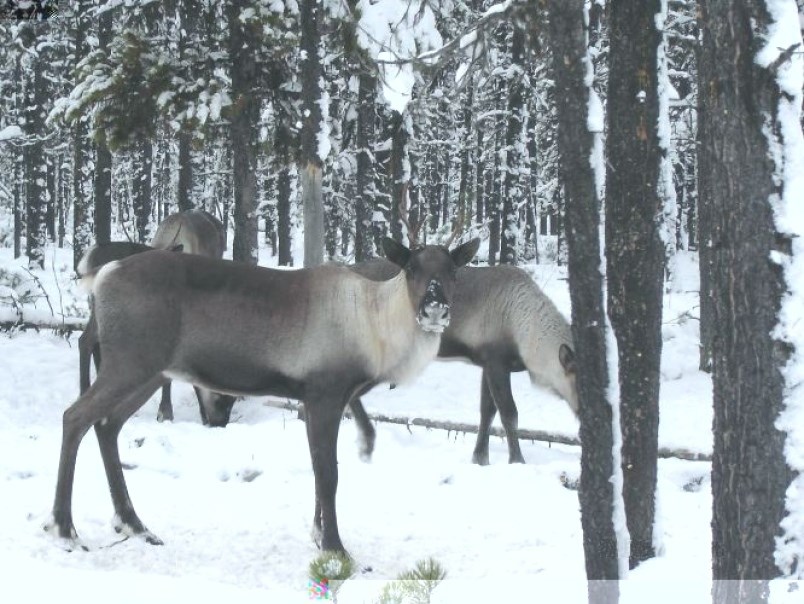Treaty 8 First Nations involved in caribou recovery efforts in the South Peace hope an extension on public consultations and the appointment of a community liaison will stem the spread of misinformation and some of the racist tone surrounding their negotiations with the provincial and federal governments.
West Moberly Chief Roland Willson and Saulteau Chief Ken Cameron met with Premier John Horgan and Forests Minister Doug Donaldson in Dawson Creek on Monday. Horgan has extended consultations until May 31, and appointed Dawson Creek city councillor Blair Lekstrom as his advisor on the file.
In a press release on Tuesday, the chiefs said Lekstrom will be instrumental in dispelling myths about the agreement and addressing the racist attitudes found in some commentary about the issue on social media.
"We denounce racism in every form. That includes 'dog whistle' statements in social media posts that promote stereotypes or invite others to imagine that there are some concealed motives lurking behind these agreements," Willson said.
"We welcome the extra time to dispel myths about the agreements. We also appreciate hearing Premier Horgan say that the provincial government denounces the racist comments and conspiracy theories that have been circulating. There are no backcountry closures."
The two took aim in particular at local MP Bob Zimmer for spreading misinformation about potential closures. There will be no restrictions on activities like hiking, hunting, fishing, and camping, and any snowmobile closures in caribou habitat will be offset with new snowmobile areas elsewhere, Willson said.
Reductions to annual allowable cuts to forestry companies will amount to 300,000 cubic metres split between the Mackenzie and Dawson Creek timber supply areas, and Tree Farm Licence 48, according to the chiefs. Those reductions are limited and manageable between the companies operating in the area, the chiefs said.
"We can't control what Canfor or West Fraser do with their mills. But if they drop a shift or close the doors, it won't be because of the caribou," Willson said.
"It won't be because of these agreements. The grandstanding has to stop. It's not factual and it's not productive. The people of the Peace deserve better."
Mining operations and pipeline infrastructure won't be impacted, the chiefs said. Lekstrom will be key in working with the mining sector and other industries to identify opportunities to support caribou recovery, they added.
"We hope and expect that Mr. Lekstrom and other local government representatives will provide local people and local governments with the facts," Cameron said.
"This is about caribou recovery pure and simple. Some politicians will continue to try to use fear to manipulate voters, but it won't work. People are smarter than that, and the agreements actually reduce the potential for impacts on communities."
Southern mountain caribou in the region have been listed as a threatened wildlife species under the federal Species At Risk Act since 2003. Last year, the federal government declared the species to be under imminent threat of recovery, starting a year-long timeline to put a strategy in place.
B.C. has drafted a partnership agreement with the Saulteau and West Moberly First Nations that proposes a series of moratoriums on resource development, and continuing support for their maternal penning program as well as an ongoing wolf cull.
It's also drafted an agreement under Section 11 of the federal Species At Risk Act with Ottawa that outlines "broad recovery actions" and gives the province access to federal funding to support those efforts.
Horgan also met with the regional district board -- made up of elected officials from across the Peace Region -- on Monday. The board has had no involvement in the drafting of the agreements, frustrating officials.
In a statement, board chair Brad Sperling said he was happy with the premier's decision to appoint Lekstrom and extend consultations.
"I'm pleased that the Province is taking the time to ensure that local voices are heard," Sperling said. "Blair knows the people and the issues in the Peace well, and I'm sure he'll be able to help find a path forward."
Others, however, aren't so happy.
The group Concerned Citizens for Caribou Recovery amassed a 35-000-signature petition asking for a halt to negotiations over the agreement. The extra four weeks isn't enough time to complete proper consultations and an economic study on how the agreements will impact industry and jobs.
"We would ask the provincial government in BC to follow the footsteps of the Alberta Government and allow 18 months for proper consultation and economic impact assessments," the group said in a post to supporters on Facebook.
Lekstrom acknowledged his longstanding friendship with Horgan helped secure his appointment. He his goal will be to balance the need to recover caribou populations as mandated by federal law with the needs of local industry.
"It's an interesting thing: I don't sit with his government, I sat with the BC Liberals," Lekstrom said.
"But at the end of the day, this is not about politics in my mind. This transcends any political party. We have families and jobs that could be on the line. I believe we can accomplish looking after the caribou, working with our First Nation communities, and still maintain the jobs and industry in the area in a way that moves caribou recovery forward.
"I've got a lot of work ahead of me, but I'm going to do it," he said.



